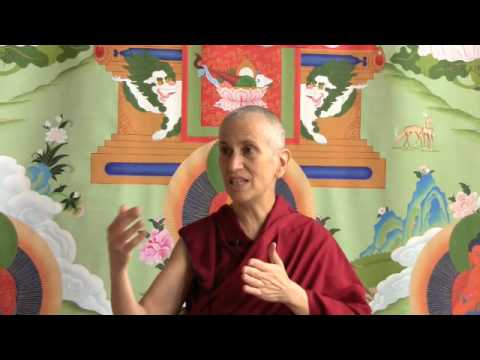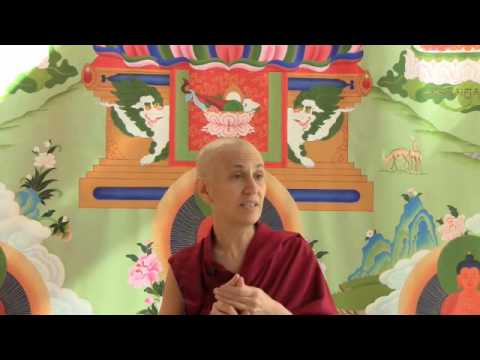Food offering: Labeling on a valid basis
Food offering: Labeling on a valid basis
Part of a series of Bodhisattva’s Breakfast Corner talks given during the Green Tara Winter Retreat from December 2009 to March 2010.
- Contemplating food, from wondrous medicine to excrement
- We can give anything we look at multiple labels
- How labels can limit and define people
Green Tara Retreat 060: Food offering and labeling on a valid basis (download)
Part 1
Part 2
Now to talk a little bit more about valid basis of designation for things and relating this to our offering contemplation. The fourth one says, “I contemplate this food, treating it as wondrous medicine to nourish my body.” So we have that. And then in other circumstances we’re told to contemplate the food, what it looks like after we chew it, as it’s digesting, the next morning—and to see that it’s just kind of basically excrement in a pre-excrement form. In other words, it’s nothing beautiful or miraculous or wonderful to get attached to
Then you may say, “Well, wait a minute. It’s miraculous medicine that nourishes my body and it’s also crap.” Excuse my French. “So, which is it?” Now, in an inherently existent world it would have to be one or the other. It could not be both. In an inherently existent world, if something is something, it is that independent of all other factors. We see here that how we regard food is going to change: depending on the context, depending on the circumstance. It wouldn’t do to look at the food as feces right before we eat because then we wouldn’t eat. Then our body wouldn’t be nourished, we would get ill, we couldn’t practice the Dharma.
We don’t use that label on the food prior to when we eat, unless we’re having such amazing attachment that we’re going to eat three half-gallons of ice cream all by ourselves. In which case to prevent that you want to think of it this way. But that’s an extreme situation. Here, before we eat, because we are eating we realize that we have to nourish our body. So we want to have a positive view of the food, but also be very clear about why we’re eating. It becomes wondrous medicine that nourishes our body because it’s medicine. The food we eat is like medicine. It makes us healthy or, if we take the wrong medicine, it makes us sick.
Do you see that we can have two seemingly opposite labels or interpretations for what the food is, according to the circumstance? Both are valid in their own context. But you have to know the context to know what it’s about. Otherwise you get confused.
It’s like anything we look at. We can give it multiple labels. The table could become a desk. The desk could become a sewing board—the boards where you measure your cloth. It could hold many different labels. And as the Cittamatrins say, it does not exist by its own characteristics as the referent or the basis of any of those labels. That’s because things are conventionally labeled. If they were inherently existent, one label to one phenomenon, nothing could ever change no matter the circumstance.
If you’re eating lunch and you call it a sewing board, then that’s not the right context to give it that label. You give it another label. The basic thing is just to get us to think that in the conventional world things are not fixed. They’re not solid. There’s flexibility. You can look at things from different angles and so on. In an inherently existent world none of that would be possible, because things would be what they are independent of any other thing. That clearly is not the case.
Audience: It seems as though you’re saying that we label things conventionally just to make communication easier and make it easier for us to know how to utilize something and to reduce confusion. That seems like the purpose of labeling.
Venerable Thubten Chodron (VTC): Yes. It is the purpose of language; to be able to communicate, and to use it as shorthand for something. Instead of saying, “that big tall monk,” (we only have one now), but at some time we might have two or five or ten, then “the big tall monk with the…” Then you have to describe him differently. Then you just say the person’s name. So language facilitates things. But the thing is when we forget that we were the one who gave it the label and we think instead that it has an essence that is that object, some objectifiable basis that you can find. That it’s labeled on that and only that. That’s when the grasping at inherent existence comes in. So we can watch that in our life. How we forget that we’re the one who gave a label to something.
There’s some discussion now that I was reading, because they’re re-doing the DSM, the manual with the list of all the psychological disorders. They’re having all this discussion because they’re trying to incorporate some things into one thing, and then take other things and divide it in, and then new ones that you invent. The thing is that as soon as you collect in your mind a set of symptoms and give it a label, then we tend to forget that we’re the ones who gave it the label. It becomes very solid. One of the people who was saying that we need to be very careful in doing this was saying, especially with children, if everything becomes a disorder, then you have a kid who speaks up for themselves and now they have defiant disorder or something. You know, it’s like everything becomes a disorder. Especially if you’re a child and you get that label, then you tend to identify with that and say, “That is me.” That’s completely wrong. It forms a very incorrect self-image on the part of the person.
This is the same way that we do when we psychoanalyze people and give them all sorts of labels. This one’s bipolar, and that one is borderline, and this one is this. It’s like we give them a label and then that’s all we see as being that person. It seems as if it’s coming from their side independent of us, but we’re the one who gave that diagnosis. Sometimes we don’t even know what the conventional diagnosis qualifications are. I don’t like that person, therefore they’re borderline. We’re very used to being our own amateur psychologist.
Audience: When I was a child, we didn’t have the diagnosis but we had labels for people like cry-babies and bullies and trouble makers. So we put them into personality disorders without even realizing that that’s what we were doing.
VTC: That’s a very good point actually that when we were kids we didn’t have such an extensive thing but there were cry-babies, and bullies, and trouble-makers, and accident-prone, the brown-nose, and teacher’s pet. We were giving all these kind of quote “diagnoses.” Let’s hear from the secondary education teacher here:
Audience: Then those people live up to that label and they milk it for all it’s worth because that’s what they believe they are. They will just funnel all that energy into those categories.
VTC: Okay, so she said that once you’re given that label as a child, you live up to it and you funnel all that energy into becoming what you think that label is because somebody gave it to you. You feel that is you so you’d better fulfill it. So many kids get trapped in that way. It’s really unfortunate.
Audience: It’s not just children, Venerable. I took a diversity training once where one of the exercises was that each person was given a label just like this, like the office bully or the office whiner, but it was put on your back so you didn’t know what your label was. But everybody in the group, and there were probably 10 or 12 people in the exercise, would relate to you as though you were your label. Within minutes it was very clear what the relationships were, what the power dynamics were in relationship to people. You know the boss was clearly labeled the boss and they start treating them like the boss, you know you’re the boss. The scapegoat was one of the big ones that we were, and that person just felt completely belittled and torn down by the end of the exercise.
This went on for 15 minutes. The role-playing was so vivid in seeing how we live up to our labels and treating each other as a label we create the very monster that we’ve labeled. It was chilling to see how we do that.
VTC: We should do that exercise sometime here at the Abbey. I think those kinds of things are quite helpful.
This is also the idea behind having a pure view. If you give people good labels then you see them in a positive way. When you see them and relate to them in a positive way they have a better chance from their side of becoming like that.
Venerable Thubten Chodron
Venerable Chodron emphasizes the practical application of Buddha’s teachings in our daily lives and is especially skilled at explaining them in ways easily understood and practiced by Westerners. She is well known for her warm, humorous, and lucid teachings. She was ordained as a Buddhist nun in 1977 by Kyabje Ling Rinpoche in Dharamsala, India, and in 1986 she received bhikshuni (full) ordination in Taiwan. Read her full bio.


